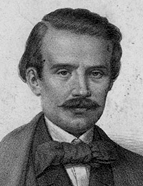

A distinguished journalist, Coelho began his career in 1849, he made his debut in the Revolução de Setembro [September Revolution], where he published a series of articles on the issues stirring Europe at the time and the various phases of the development of democratic ideas, which he actively supported. As a key contributor to A Revolução [The Revolution], he strongly opposed the government. For a time, he also served as the chief editor of A Emancipação [The Emancipation] , a newspaper aligned with his political views: In 1851, he founded A Semana [The Week], a literary newspaper featuring contributions from prominent writers of the time. Some of his best articles focused on notable literary figures. He had previously written a variety of biographies and a collection of national character sketches in the Revista Peninsular [Iberian Peninsula Magazine] .
In Panorama, Coelho published a detailed and comprehensive biography of Almeida Garrett. He also wrote for Época [The E ra], Pharol [Lighthouse], Civilização Popular [ Popular C ivilization ], Discussão [Debate], Politica Liberal [ Liberal Politics ], Jornal do Commércio [ Journal of Commerce ], Democracia [Democracy], where his elegant style and the vigour with which he addressed a wide range of topics were highly regarded. He even wrote a biography of Almeida Garrett in Spanish, which was published in Revista Peninsular [Iberian Peninsula Magazine]. Virtually every literary journal of the time featured his work. Additionally, he served as the director of Diário de Lisboa [Lisbon Daily] during its restructuring in 1859, and for an extended period, he wrote editorials for O Século [The Century] .
